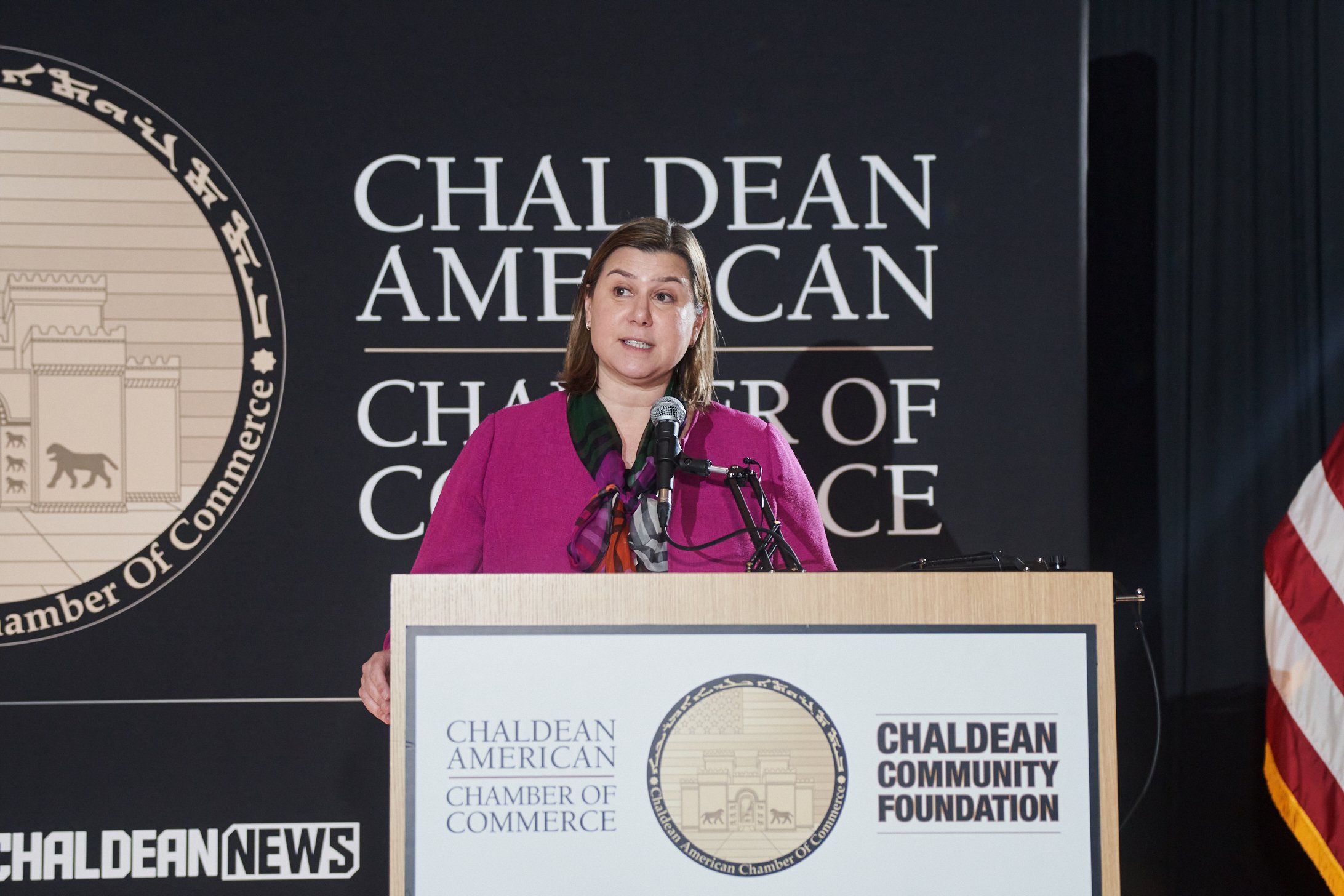U.S. Rep. Elissa Slotkin Introduces Resolution to Support Minorities in Iraq
Elissa Slotkin speaks at the 20th Annual CACC Awards Dinner on April 28, 2023.
By Cal Abbo
For centuries, Christian communities in Iraq have served as soft targets for other groups to conquer. The evidence is laid out in history books, generational memories, and the stories of constant immigration that leads to today’s diaspora.
The most recent enemy, known to the world as the Islamic State (ISIS), was one of the most evil our community has experienced. As noted in U.S. Rep. Elissa Slotkin’s resolution, ISIS committed countless atrocities against ethnic and religious minorities in Iraq and elsewhere. Murder, subjugation, forced conversion, kidnapping, human trafficking, torture, rape, and destruction of ancient artifacts are only some of the crimes committed against Chaldeans and other Christians in the region.
ISIS looted and destroyed many Chaldean villages after its invasion began in the summer of 2014. Fortunately, many residents were warned and fled before ISIS arrived. Still others were killed or kidnapped. This left a sizable refugee population, and even after the defeat of ISIS in late 2017, few have returned to their dilapidated and destroyed towns.
Efforts by the international community and the diaspora to rebuild the destroyed areas are rapidly expanding, but many Chaldeans would rather forget the old way of life and move to a safe city like Erbil or a different country altogether. Without the continuing support of the Iraq government, these old towns will fall off the map or become repurposed and their ancient treasures will die with them.
Empty villages have since become the favorite target of land grabbers trying to abuse the precarious situation of Christians. They don’t expect these indigenous populations to return to their homes, and current policy is only aiding this way of thinking.
That’s why Rep. Slotkin, whose 7th congressional district includes Lansing and extends as far East as South Lyon, introduced the resolution to address various Christian communities and call for Iraq to create an ongoing fund dedicated to rebuilding their towns.
“Michigan’s vibrant Chaldean community has a long history in our state, which is why I met with Chaldean leaders in Iraq last fall as part of a Congressional Delegation to the Middle East,” Slotkin said in a statement to the Chaldean News. “I took what I learned back to D.C. and that’s why I’m introducing a resolution to uphold the human rights and dignity of religious and ethnic minorities in Iraq.”
Slotkin said it’s critical for U.S. policy to support the security, stability, integration, and political representation of various minority groups including Yezidis, Turkmen, Shabak, Sabaean-Mandeans, Kaka’i, and indigenous Christians.
The resolution recognizes that these communities “have been an integral part of the cultural fabric and history of Iraq and the broader Middle East for millennia … internally displaced members of these religious and ethnic minority communities continue to face significant challenges to returning to their ancestral homelands.”
The resolution has five main points of action for the House of Representatives.
The fundamental human right and dignity of the religious and ethnic minority communities of Iraq should be a policy priority of the United States and the international community.
The restoration of security, stability, and economic opportunity as well as the safe return of displaced indigenous peoples to their homeland should be a policy priority of the United States and the international community.
The restoration of homes, schools, churches, and other religious sites and community buildings should receive a specific and enduring budget allocation from the Iraqi Government as well as continued support from international aid donors.
The effective representation in the government of indigenous populations, including those who are displaced, is essential to restoring and upholding the rights of these communities.
The Secretary of State should support greater regional integration for minority groups in Iraq and promote opportunities for affected minority groups to achieve greater administrative autonomy within the federal structure of the Republic of Iraq.
For millennia, Christians in the Middle East have lived under the rule of someone else and have had to give up control over their own lives. Rarely have they been free from an overbearing influence, whether it’s Persians, Parthians, Sassanians, Islamic caliphates, Mongols, Ottomans, the British, or the nation of Iraq, these indigenous communities have long struggled for independence.
The resolution’s call for greater administrative autonomy is a challenge to that history. Many efforts have been made to create a government or nation out of the minorities in northern Iraq especially. After the Sayfo, a genocide of Chaldeans and Assyrians in the Middle East, and the end of WWI, indigenous communities proposed a sovereign Assyro-Chaldean nation in the North of Iraq at the Paris Peace Conference, but were neglected by the British empire that gained control of the territory.
This was the most recent serious effort to gain autonomy from a higher power, however, new demands are being made for administrative autonomy, and this resolution only adds to those voices.

